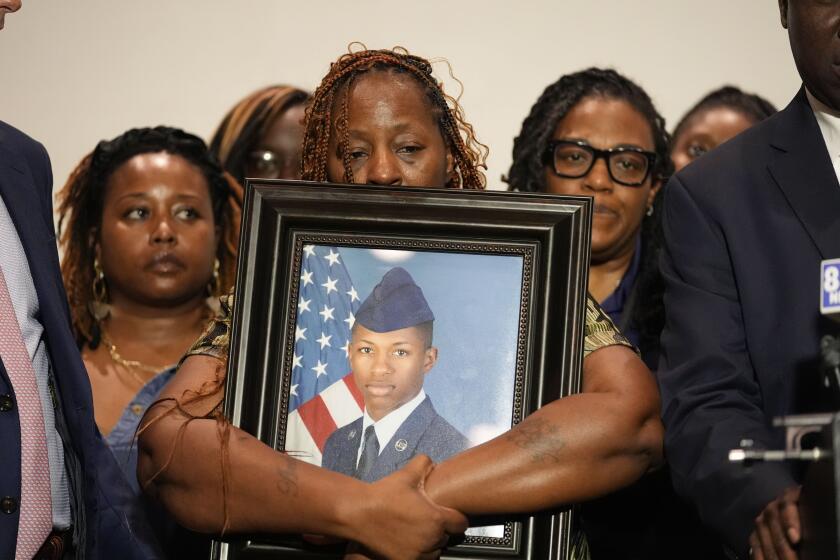4 Israelis Are Killed and 8 Wounded; Army Seals Towns, Vows Retaliation
Four Israelis were killed and eight wounded Monday by Palestinian gunmen staging ambushes in the West Bank and Gaza Strip, the Israeli army said.
Israeli officials denounced the killings as an escalation of Palestinian guerrilla warfare and promised retaliation. Late Monday, the army announced that it was sealing off all Palestinian towns and villages, barring all travel in and out of the areas.
In Gaza, Israeli forces killed two Palestinian teens Monday. Two other Palestinians were killed in the West Bank and a fifth man died of a gunshot wound to the head suffered during demonstrations Saturday, Palestinian officials said. The mortally wounded man was the nephew of Gaza’s top Palestinian security official, Col. Mohammed Dahalan, and had been evacuated to an Israeli hospital for treatment--an unusual move in the current tense climate.
In nearly seven weeks of raging riots and gun battles that have claimed more than 210 lives, Monday marked the first day that as many Israelis were killed as Palestinians.
It was also a day that seemed remarkably quiet, until late afternoon.
Around dusk, Palestinian gunmen in a speeding Fiat Uno opened fire in separate instances on a private car and on a bus transporting soldiers and settlers over an Israeli-controlled road near the Jewish settlement of Ofra in the West Bank, about 15 miles north of Jerusalem. Two soldiers died in the bus, which was pocked with about 50 bullet holes. The soldiers had served as guards at a settlement.
In the car, a Peugeot slowing at an intersection to make a turn, a teacher from a nearby settlement was killed.
“A car passed me when I was slowing down to turn, then he continued driving on the center lane, opening fire at us,” the driver of the Peugeot, Avi Tzarel, told Israeli television Monday night. “I looked at the teacher sitting next to me and I saw two hits and blood gushing out of her head. I understood that nothing could be done, and she died on the spot.”
The Fiat escaped toward the Palestinian-controlled city of Ramallah, the Israeli army said, and its troops blocked off West Bank roads to launch a search. The road where the shootings took place is a so-called bypass road, like many constructed by Israel throughout the West Bank to allow Israeli civilians and settlers to avoid driving in Palestinian towns or cities.
Later Monday in Gaza, a truck driver headed down an Israeli-controlled road to the Gush Katif bloc of Jewish settlements was ambushed and shot to death. His assailants fled.
The ambushes were the latest examples of a shift in Palestinian tactics, from large demonstrations that claimed high numbers of Palestinian casualties, to guerrilla-style operations targeting specific Israeli positions.
Palestinian militia commanders came under criticism from their own political leaders for using demonstrations as cover for shooting at Israeli forces, whose return fire killed many Palestinian youths.
Palestinians--and some Israelis--are angered by the presence of about 200,000 Jewish settlers in often remote enclaves scattered over the West Bank and Gaza Strip. The settlements and the Israeli-controlled roads to reach them chop up territory that Palestinians say will eventually form their state. In the meantime, Israel must invest considerable resources to protect its interests.
Monday’s attacks brought a renewed clamor from Jewish settlers and the military for more aggressive retaliation against the Palestinians.
Israeli Prime Minister Ehud Barak, who met Sunday in Washington with President Clinton on how to end the violence, said Monday night through an aide that the latest escalation will not be tolerated.
Israeli television Monday night pointedly told listeners that more Israelis have now died in nearly seven weeks of clashes with the Palestinians than in an average year of fighting in Lebanon. The so-called war of attrition in Lebanon became a low-intensity conflict that sapped the morale of the Israeli public until Barak ordered a unilateral withdrawal in May after 22 years of occupation.
Israeli TV commentator Ehud Yaari, an expert on Israeli-Palestinian affairs, said the Palestinians were trying to put pressure on the roads leading into the Jewish settlements.
Clinton is pressing Barak to resume negotiations with Palestinian Authority President Yasser Arafat within seven weeks, a time frame Arafat has already agreed to, Israeli reporters traveling with Barak in the U.S. said Monday night.
More to Read
Start your day right
Sign up for Essential California for news, features and recommendations from the L.A. Times and beyond in your inbox six days a week.
You may occasionally receive promotional content from the Los Angeles Times.







